
Toronto tops list of Canada’s most youth-friendly cities
Theglobenandmail.com
May 9, 2018
Tavia Grant
A first-ever ranking of Canada’s “most youthful” cities puts Toronto on top as the best place for young people to live, work and play, based on metrics such as the cost of a transit pass, monthly rent and concert tickets along with measures of youth unemployment, digital access and crime stats.
The index, to be published Wednesday by Youthful Cities, a Toronto-based social enterprise, examines how attractive 13 Canadian cities are to people between the ages of 15 and 29.
The rankings are based on 121 different indicators – collected by young people across Canada − and weighted by using an opinion survey of youth on what matters most to them. It’s a work in progress with longer-term plans to create an advisory panel and to be published annually.
Given the public-policy focus on older people (who also have more voter clout), the index aims to nudge cities to adopt “youthful” qualities – such as being open, innovative and dynamic – attributes which are also more likely to attract and engage young people.
Young people “feel that youthful cities are more prosperous, have better economies, better social connectedness, attract more entrepreneurs and are generally happier places” and that makes them attractive for youth and for people of all ages, said Robert Barnard, co-founder of Youthful Cities, a for-profit with a social purpose .
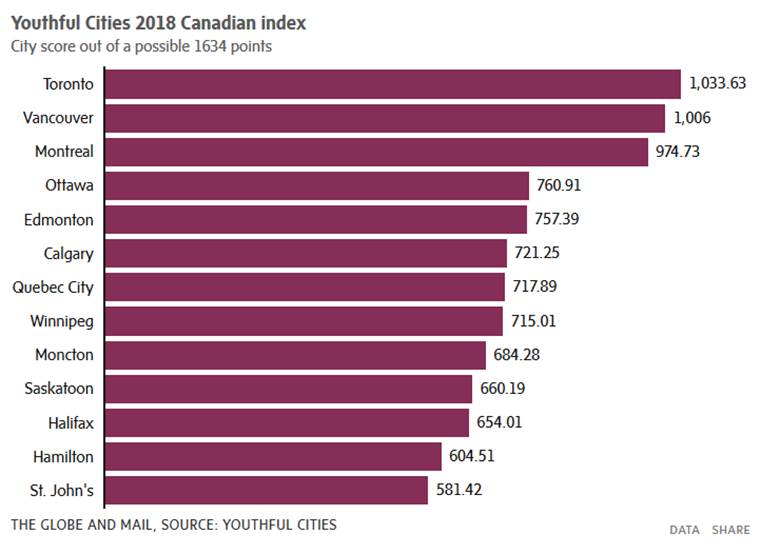
The index come as demographics in Canada are shifting: For the first time ever, seniors outnumber children, according to 2016 census data, a change that is reshaping everything from the labour market to health-care demand and the tax base. Municipalities will need to attract, engage and retain young people to their cities – and jobs market − or risk losing out.
Youth “are needed more than ever before in our aging society and yet they are more mobile – youth vote with their feet,” the report said, adding that its 2016 survey found seven in 10 North American youth said they would leave their current city in the next several years. “Competition for this important labour force will intensify, yet there is a crisis of youth engagement in our cities.”
The rankings are based on data collected from sources such as the census and Statistics Canada, along with municipal sources and university reports. Data collection for this study was between September, 2016, and December, 2017. It is weighted according to 20 areas that were deemed important to youth, taken from a previous global survey.
Rankings
The ranking of 13 cities places Toronto at the top followed by Vancouver and Montreal. St. John’s and Hamilton land at the bottom.
Toronto leads the country because of its diversity and civic engagement. Canada’s largest city – where youth comprise a fifth of the population − scores well in entrepreneurship and creative arts. It fares worse in some areas such as accessibility of free WiFi, commuter time by transit and the cost of rent.
Vancouver scores well for its public spaces, such as public libraries, walkability and sports fields – though on affordability, it has the lowest rank in Canada.
Montreal outperforms other cities in digital access and transit, along with food, music and nightlife – but fares comparatively worse on health (due to a lower legal age for buying cigarettes).
Montreal outperforms other cities in digital access and transit, along with food, music and nightlife, thanks to well-loved establishments such as La Petite Idée Fixe, a Mile End dive.
St. John’s is at the bottom, with lower ratings for walkability, youth unemployment and diversity. Hamilton scored poorly for its lack of free WiFi and the absence of security measures on its public transit.
The Canadian index comes after the same organization produced a global ranking of youthful cities, in 2015, which listed New York as the top city in the world for young people, followed by London and Berlin. Toronto was the top Canadian city in the global rankings, in sixth place.
This isn’t the first ranking that touts Toronto’s advantages. A 2015 global “youth economic strategy” index, for the Citi Foundation, listed Toronto as the best city in the world for youth of 35 cities measured.
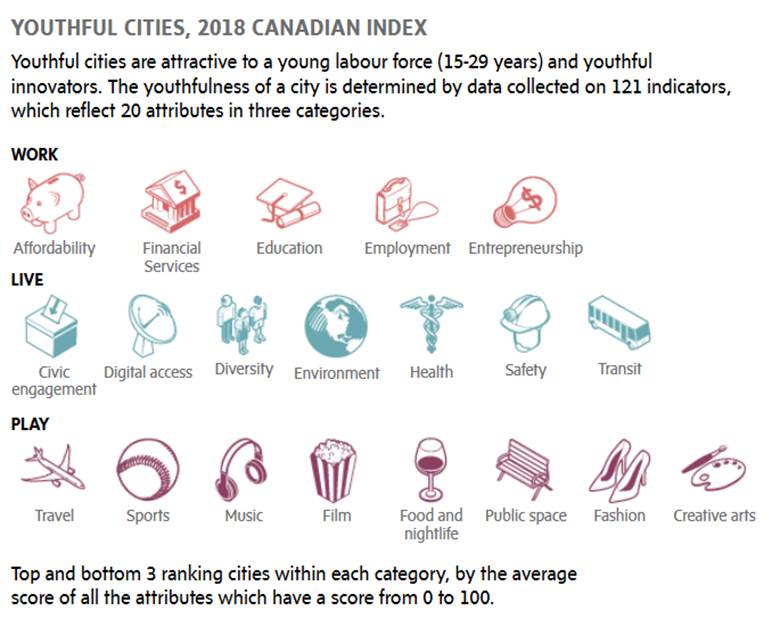
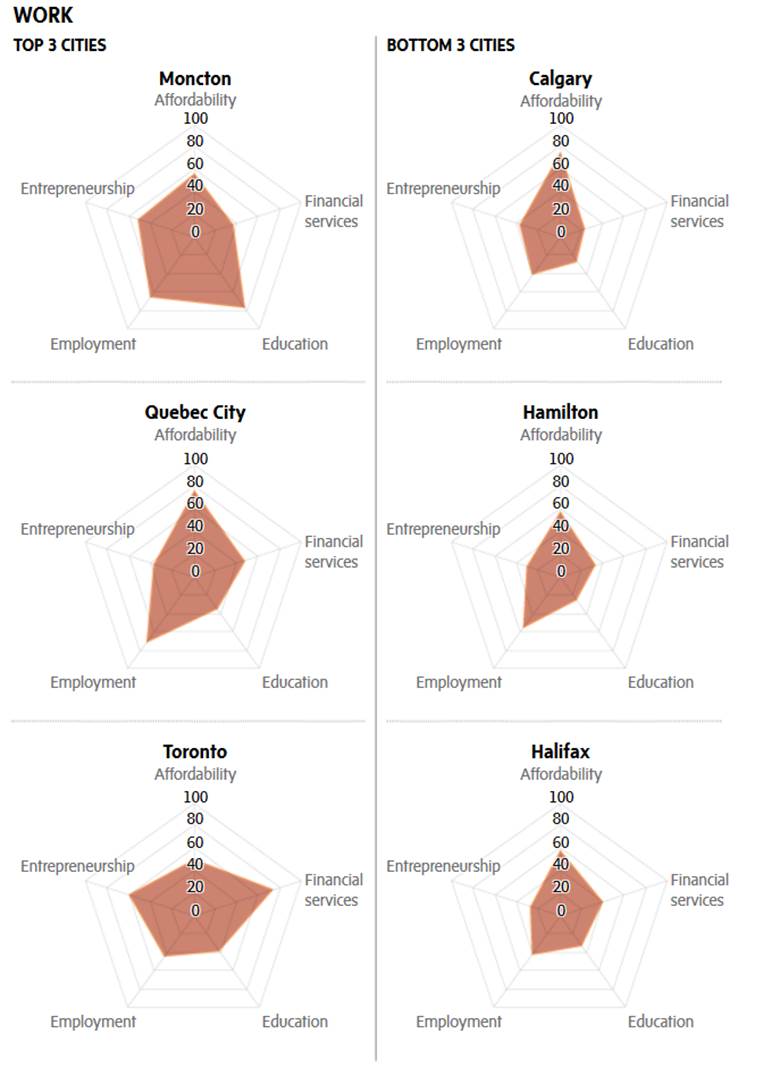
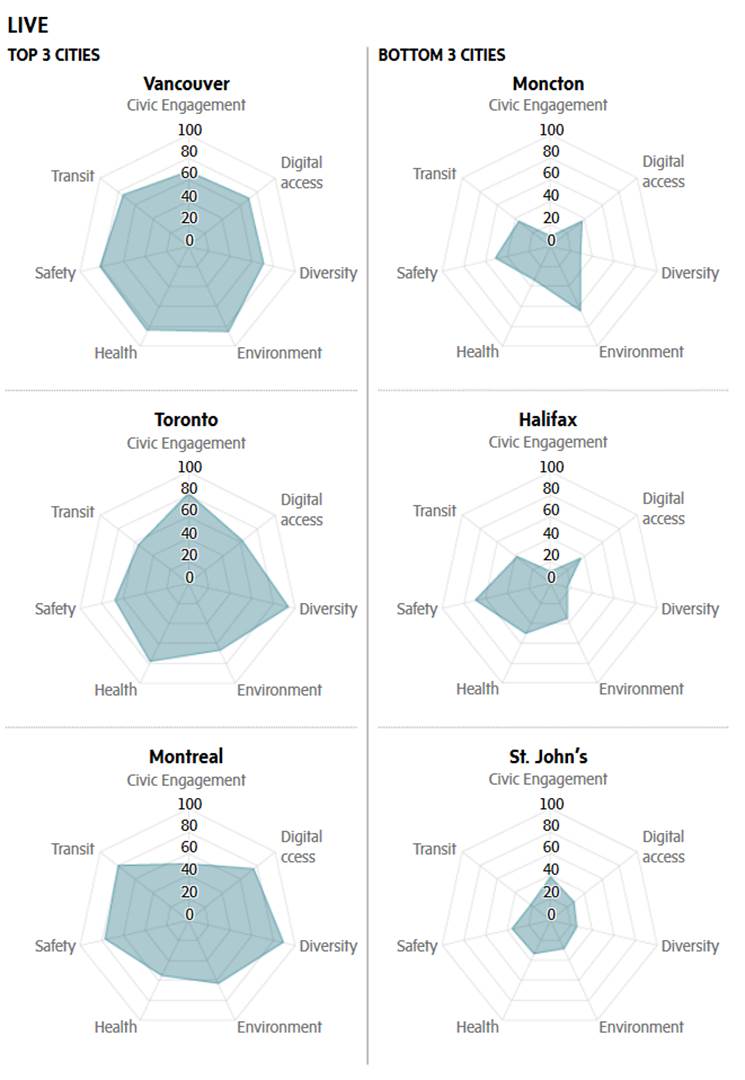
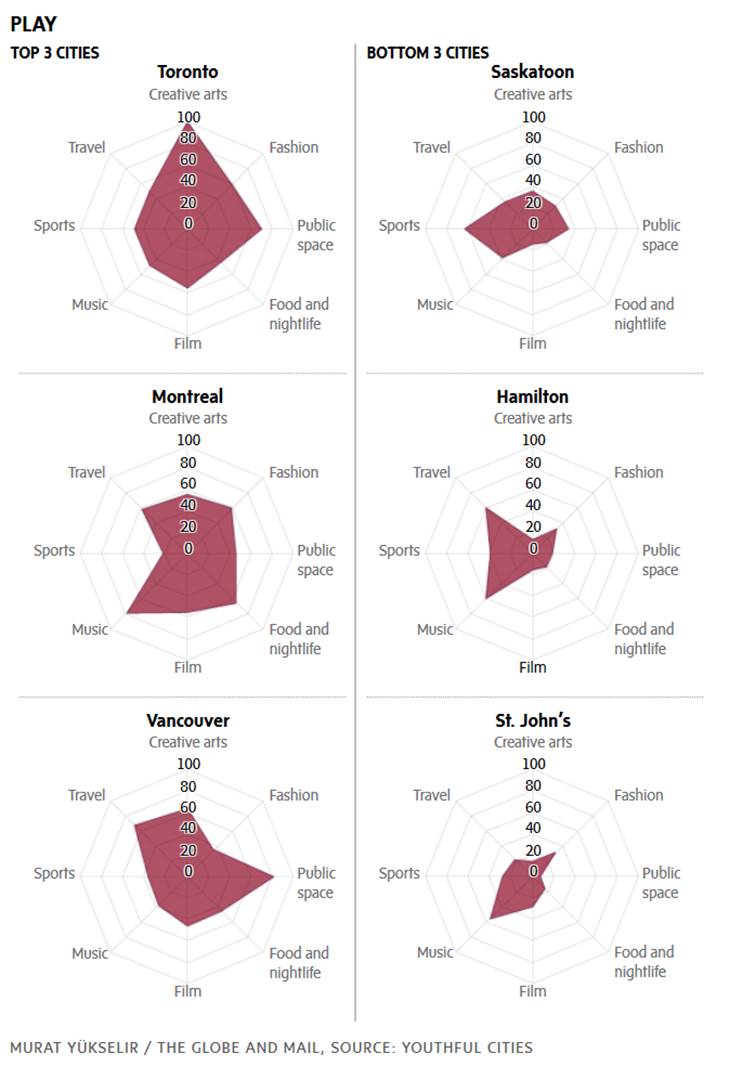
Attributes
The index includes attributes such as entrepreneurship and the environment. It compares details that can affect quality of life, such as the cost of sports shoes, a dozen eggs, movie tickets and cell-phone data packages.
Open this photo in gallery
Vancouver scores well for its public spaces, such as public libraries, walkability and sports fields – though on affordability, it has the lowest rank in Canada.
It looked at the availability of health clinics and bike lanes, homicide rates and the level of carbon emissions in each city. It included measures on the openness to LGBTQ communities (by, for example, looking at whether there is a Pride Parade) and the youth unemployment rate.
The attributes most important to youth, based on a previous global survey, are health, safety, transit and affordability, said Mr. Barnard.
Diversity
Toronto is tops when it comes to the diversity measure, and not just in Canada. By this measure, Toronto is also No. 1 in the Youthful Cities’ 2015 global diversity ranking too.
It fares well in areas such as the languages people can vote in and the diversity of religion. This category includes factors such as how open a city is to LGBTQ issues and rights (where Calgary fares well), and to cultural or gender differences.
It also looks at the diversity of food (where Montreal tops). Montreal ranks second in Canada for diversity.
“I do see that diversity ... reflected in the every day,” said Edna Ali, executive director of the Toronto Youth Cabinet, the youth advisory body to the City of Toronto. She also sees room for improvement – not all communities have equal opportunities, inclusion and accessibility could be better, youth underemployment is too high and affordability poses a huge challenge for young people.
Ms. Ali, 22, who was born and raised in Toronto and whose parents are from Somalia, sees Toronto’s greatest attribute as its openness to people of all backgrounds. “This is a place that you can be in and take up space, and that’s an option for folks who oftentimes may not have the right to vote, [that] is something that makes Toronto a wonderful and amazing place to live.”
Five Facts
- Hamilton is the city with the cheapest average concert tickets. Live performances remain affordable amid the city’s thriving music scene.
- Saskatoon is the best city for sports fans and athletes. It has the highest number of professional sports teams, relative to its population, and the cheapest gym memberships.
- St. John’s has, by far, the most affordable rental housing of the 13 cities. Its average monthly rental housing is more than $1,000 cheaper than in Canada’s most expensive cities.
- Winnipeg has the largest Indigenous-advisory board among the cities and the NHL’s Jets are the first pro team in Canada to begin sporting events with a land acknowledgment. The city is emerging as a leader in recognizing its colonial history.
- Moncton has the highest secondary-school graduation rate of the cities measured and it has the highest youth full-time jobs as a percentage of total employment.
